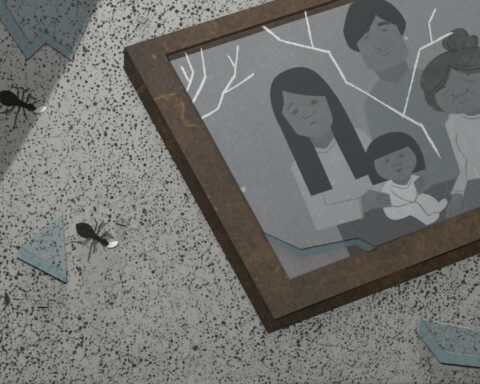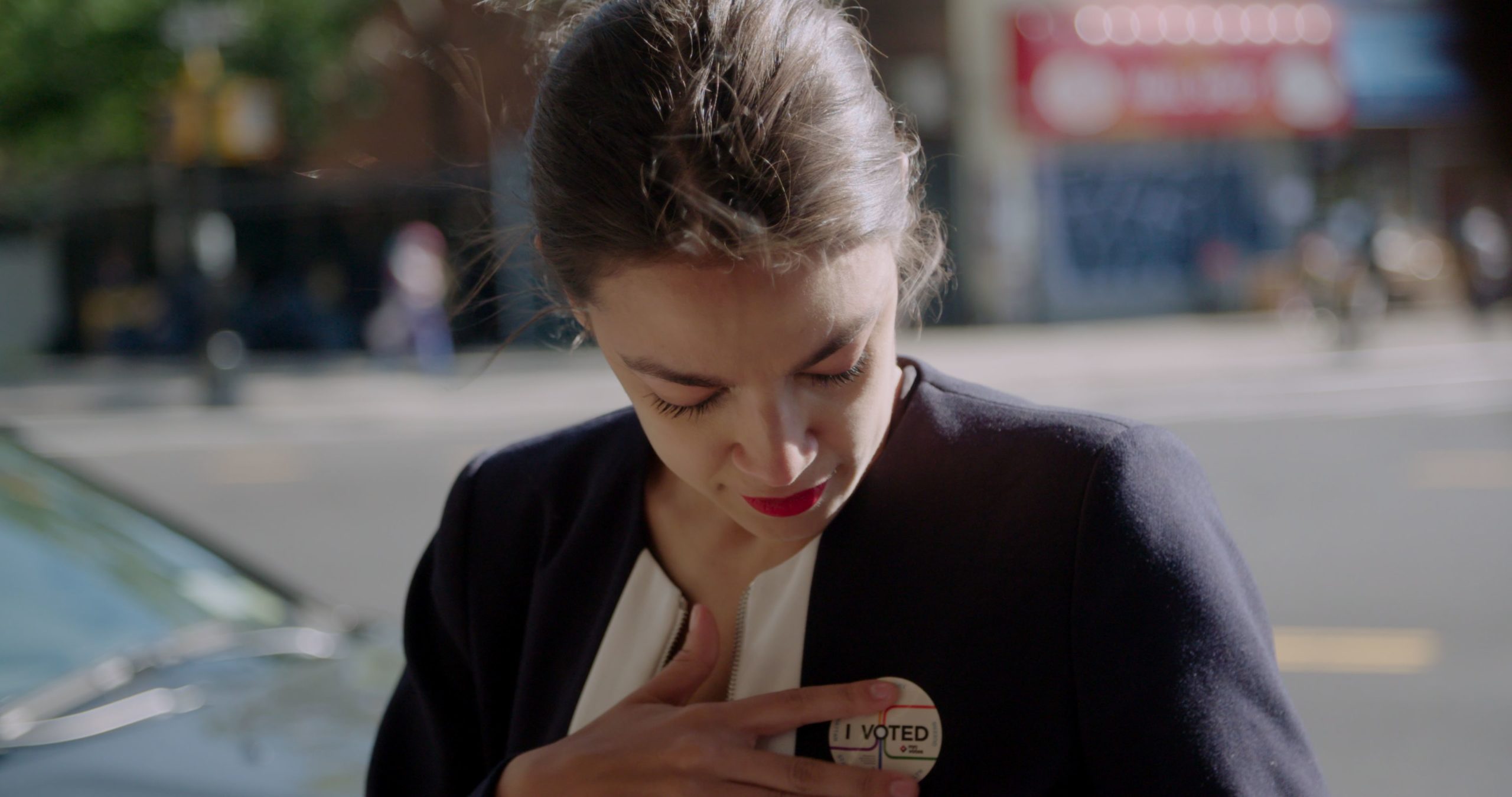Goodness gracious, this year’s Oscar-nominated short docs are a dire bunch! They’re great, naturally, but, as the kids say, they’re depressing AF!!! The menu of the nominated shorts features death, racism, the migration crisis, women fighting the Patriarchy, and some good old-fashioned Nazis. In short, they’re an appropriate bunch to represent the cultural pulse of 2018.
Let’s start with the Nazis. An unsettling chorus of “Heil, Hitler!” echoes throughout Marshall Curry’s haunting nominee A Night at the Garden. This archival film presents footage of a 1939 event in which 20,000 hate-filled white supremacists convened at New York’s Madison Square Garden to celebrate the rise of Nazism. The rows and rows of American Nazis could easily be taken from Leni Riefenstahl’s Triumph of the Will, but they could just as readily be black and white images from a Donald Trump rally. Although this seven-minute short brings to a wider audience important archival footage, which has been online for years, one wishes Curry used the film beyond the presentation of material. The images, delivered plainly and matter-of-factly as they are, however, provide an unsettlingly relevant portrait of a little told chapter of the USA’s history.
Behind the story of Black Sheep, arguably the strongest and most compelling of the nominated documentaries, is a lesson on the damaging and pervasive impact of white supremacy. The film features a disarmingly candid interview with Cornelius Walker, a Nigerian-born Brit who recalls his encounters with toxic, violent racism and the shame and self-loathing he internalized as a result. Walker describes the eye-opening experience of coming home from school and seeing his mother weeping before the television set while watching news coverage of the murder of Damilola Taylor, a young Nigerian boy who was stabbed on his way home from school. Recognizing that Taylor could have easily been one of her sons, Walker says his mother moved the family away from London to be safe. However, Walker recalls being the only person of colour in his new neighbourhood, which made him an easy target for racist bullies.
Rather than fight back, though, Walker tells how he joined his band of aggressors. His emotional account of hating himself for being Black has a visceral impact as he conveys his story. Director Ed Perkins shoots these interviews in intimate close-ups with Walker speaking before a plain black backdrop, which ensures that every tinge of regret, hate, anger, and shame registers while his testimony takes audiences through a gruellingly difficult childhood that led to self-loathing and a descent into violence. Black Sheep complements these stark interviews with dramatic interpretations of Walker’s childhood in which a series of non-professional actors authentically bring the story to life. Newcomer Kai Francis Lewis plays Walker and proves a quietly effective presence as the actor conveys the subject’s physical transformation while Walker describes how he bleached his skin, changed his hair, and wore blue contact lenses to mask the blackness that made him a target. Black Sheep, produced by Man on Wire and Searching for Sugar Man’s Simon Chinn and the team at The Guardian’s slate of short documentaries, is an exceptionally well-crafted documentary that combines long form journalism with artistic insight. It’s easily the standout film in this year’s crop of contenders as a work of art and as an example of the innovations in documentary storytelling. Shorts like Black Sheep put vital voices front and centre in telling their own stories through documentary.
Similarly, The New Yorker’s candidate Lifeboat, directed by Skye Fitzgerald, provides a timely and harrowing story. The doc offers an immediate account of the migration crisis as it goes to the front lines of rescue missions with Captain John Castle. The soft-spoken, world-weary sailor shares his experience saving lives on the Mediterranean Sea as countless refugees escape conflict. Lifeboat gets up close to the action with journalistic rigour as the doc gives audiences a firsthand account of the sheer volume of people who cross the sea in search of a better life with many of them perishing along the way. This emotionally draining film offers few answers and even less hope in a dire crisis.
There’s also little relief in the utterly bleak end-of-life saga End Game, directed by Rob Epstein and Jeffrey Friedman. This exhausting Netflix doc finds laudable access to the lives of several terminally ill patients in the San Francisco Bay Area. From a revolutionary hospice to halls of the University of California-San Francisco Medical Center, doctors and families consider all aspects of a loved one’s care when death is near and the patient has no chance for recovery. Much of the doc centres on the compelling story of Mitra, a 45-year-old Iranian-American with an aggressive form of cancer, as her husband and mother disagree over how best to reconcile their loved one’s suffering with the difficulty of letting her go. Additional subjects include Dr. Steve Pentilat and Dr. B.J. Miller, who ensure that humanity and dignity are provided to all parties while facing, accepting, and welcoming the final stage of life. The doc, shot in intimate verité style so as to unobtrusively observe families as they spend their final moments with loved ones, captures the end of life conversation with objectivity and candour—but it’s pure hell to watch.
The shorts programme finds a molecule of levity in the empowering Period. End of Sentence. The film finds hope for change in a patriarchal society as director Rayka Zehtabchi offers a study of India where menstruation is a major taboo and few women receive the resources or education for sanitary care. Period is depressingly eye opening in its depiction of patriarchal mores quashing the health and self-esteem of women, who are stigmatized for experiencing the natural cycle of their bodies. The doc moves from hopelessness to a bright future as it finds the story of several women in a rural village who band together when a socially conscious entrepreneur empowers them with a machine to mass-produce sanitary pads. Although it’s the most straightforward and conventionally constructed film of the bunch, Zehtabchi finds in her no-frills documentary a rousing portrait of women enacting positive change in the face of a culture adverse to progress. Featuring an extensive roster of producers, executive producers, and movers and shakers, including awards campaign powerhouse Lisa Taback (who led Moonlight, Spotlight and other titles to multiple Oscar wins) and a gaggle of celebrities listed as supporters, Period. End of Sentence is almost undoubtedly the film to beat. Its inspirational message, moreover, is bound to help it stand apart from the unbearably dark flock.
The Oscar-nominated short docs open on Friday, February 8 in Toronto at TIFF Lightbox, Vancouver at Vancity Theatre, and in Montreal at Cinéma du Parc.












